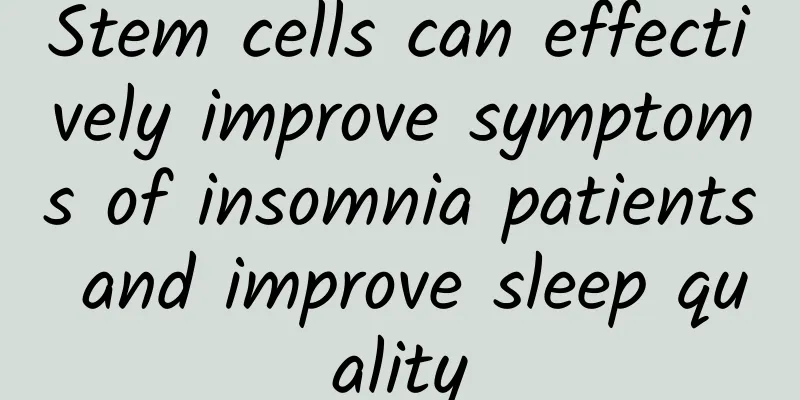Stem cells can effectively improve symptoms of insomnia patients and improve sleep quality

|
Sufficient sleep, a balanced diet and proper exercise are three health standards recognized by the international community. One-third of our life is spent sleeping, and five consecutive days of sleeplessness can even affect our survival! But the reality is that in today's world where electronic devices are prevalent, sleep disorders have become the norm. 01How do you know yourself To determine whether you have "poor sleep" , you can compare the following situations and make a simple judgment: ①Difficulty falling asleep, such as lying in bed for a long time (more than 30 minutes) and still not being able to fall asleep; ② Difficulty maintaining sleep, for example, after falling asleep, you will wake up frequently (more than 2 times), the time of waking up exceeds 30 minutes, or it is difficult to fall asleep again after waking up; ③Waking up early, for example, you planned to get up at 7 o'clock, but woke up earlier than the expected time (more than 1 hour); ④ Dissatisfied with sleep quality. This is a subjective idea. Maybe you feel that you don’t sleep well or you still feel very tired after waking up. ⑤ Fatigue, general discomfort, emotional instability, drowsiness during the day of the next day, affecting work and study; ⑥ If insomnia symptoms occur at least 3 times a week, it is short-term insomnia; if they last for more than 3 months, it is chronic insomnia. If you suffer from the above sleep problems, it can basically be diagnosed as "poor sleep", which is collectively referred to as "sleep disorder" in medicine. 02What problems will lack of sleep bring? 1. Long-term insomnia may cause the immune system to collapse Dr. Stoyan Dimitrov and his team at the University of Tübingen in Germany found through research that long-term lack of sleep can affect normal immune function and even cause the immune system to collapse. By testing the blood samples of experimental volunteers, the researchers found that a few hours of sleep loss would significantly reduce the efficiency of T cells. The immune cells of normal sleepers bind best to the targets that need to be eliminated, and as sleep deepens, the immune efficiency increases, reaching its highest value at 6 a.m. Sleep can produce various cytokines to promote T cell activation, increase the diversity of T cell receptors, and enhance the body's immune defense mechanism. Conversely, sleep loss caused by insomnia will reduce the working efficiency of T cells, and lack of sleep will reduce the working ability of the body's immune cells. 2. Negative effects on various body systems Lack of sleep increases your risk of chronic disease and takes longer to recover from illness. The harm of insufficient sleep involves various systems of the body: 1) Diabetes: It will affect insulin resistance and aggravate type 2 diabetes. 2) Cardiovascular disease: This affects the processes of maintaining blood pressure and blood sugar levels and controlling inflammation. 3) Intestinal diseases: It is easy to cause inflammatory bowel diseases, and the risk of Crohn's disease recurrence will double. 4) Hormone levels: It affects the production of hormones, including growth hormone and testosterone in men. … 03 **Stem cells are expected to improve chronic insomnia symptoms and ** improve patients' sleep quality At present, the clinical treatment of chronic insomnia mainly includes drug and non-drug treatment methods. Although traditional sedative hypnotic drugs are effective and quick to take effect in the treatment of insomnia, they have obvious adverse reactions. Non-drug treatments include cognitive behavioral therapy and traditional Chinese medicine non-drug treatment. The treatment process of cognitive behavioral therapy is complicated, time-consuming and prone to relapse. As stem cell research has become a hot topic in global research, stem cell technology has also brought good news to insomnia patients! In 2017, a clinical observation result published in the Journal of Chinese Clinical Psychology, "Clinical Observation on the Treatment of Chronic Insomnia with Umbilical Cord Mesenchymal Stem Cells", showed that umbilical cord mesenchymal stem cells can improve the sleep quality of patients with chronic insomnia in the long term. Methods: Thirty-nine patients with chronic insomnia were randomly divided into a control group and a transplantation group. Twenty patients in the control group (4 males, 16 females, average age 51.38±8.76 years old) were treated with oral sleeping pills (alprazolam) for 1 month; 19 patients in the transplantation group (3 males, 16 females, aged 36-65 years old, average age 49.29±7.45 years old) were given UC-MSCs transplantation intervention once (cell number: 3-4*107). The SF-36 health survey and Pittsburgh Sleep Quality Index (PSQI) were used to evaluate the clinical efficacy in both groups, and the patients were followed up for 12 months. Results: ① Changes in PSQI scores: 2 weeks after clinical treatment, the sleep quality score of the control group was significantly higher than that of the transplant group. 1 month later, there was no difference in the sleep quality and quality of life scores between the two groups. 2 months later, the sleep quality score of the transplant group was significantly better than that of the control group, and this continued until the end of follow-up. 3 months later, the quality of life score of the transplant group was significantly better than that of the control group, and this continued until the end of follow-up. ② Changes in SF-36 scores: One month after clinical treatment, the quality of life and sleep quality scores of the transplant group were significantly better than before the intervention, and continued to be better than before the intervention in subsequent follow-up; the sleep quality score of the control group began to be significantly better than before the intervention after 2 weeks of observation, but after 3 months of observation, the quality of life and sleep quality scores of the patients decreased and were no different from before the intervention, and continued until the end of follow-up. 04The mechanism of action of stem cells in intervening insomnia symptoms Chronic insomnia patients produce a large number of free radicals in their bodies, which damage the neurons in the cerebral cortex. After clinical intervention with umbilical cord mesenchymal stem cells, umbilical cord mesenchymal stem cells can differentiate into nerve cells and secrete a variety of cytokines, thereby reaching the damaged area of tissue cells and playing a repair role. Umbilical cord mesenchymal stem cells can also promote regulatory T cells to eliminate immune cells and inflammatory factors that increase in the patient's body due to insomnia through immune regulation , playing a significant anti-inflammatory and immune regulatory role. At the same time, clinical intervention with umbilical cord mesenchymal stem cells can also promote the secretion of a large number of neurotrophic factors, improve the neurotransmitter environment, and effectively maintain the integrity of nerve cell tissue; enhance and improve microcirculation and tissue nutrition, effectively prevent neural stem cell lesions, prevent mental problems caused by long-term insomnia, and promote the improvement of symptoms such as neurasthenia caused by long-term insomnia. Insomnia is a common sleep disorder that affects the lives of millions of people around the world. With the advancement of science and technology and the deepening of research, stem cell intervention for insomnia is expected to become a feasible clinical treatment method. At the same time, we should also strengthen our understanding and attention to sleep health issues and develop good sleep habits to improve the quality of life. Disclaimer: The content comes from the Internet, and the copyright belongs to the original author. This article is for popular science knowledge, for information exchange purposes only, not for commercial purposes. If it involves the content, copyright and other issues, please contact us to delete it. END |
>>: How to prevent and recover from stroke?
Recommend
Illustration of the location of spots on women
Fair and flawless porcelain skin is the ideal of ...
How to take care of the pimples at the vaginal opening?
The vaginal opening is a barrier for women to res...
What kind of tea is Pu'er tea? Can Pu'er tea still be drunk after 10 years?
Pu'er tea is produced in Xishuangbanna, Linca...
Different methods of skin whitening
Many people wish to have snow-white skin, especia...
How to supplement women's anemia
In fact, quite a number of female friends have an...
Brown liquid flowing from the woman's vagina
Under normal circumstances, women's leucorrhe...
Why does the body temperature not rise after ovulation?
For normal women of childbearing age, their basal...
Does pearl powder have side effects when used as a facial mask?
Nowadays, people pay more and more attention to t...
How to drink water correctly during confinement
It is best to drink warm water during the confine...
Can I get pregnant by taking birth control pills?
In life, for many couples, the main function of c...
Why do I bleed slightly after sex?
What is the cause of bleeding during intercourse?...
Causes of irregular menstruation during menopause
We all know that women have to endure the pain of...
Why is there sudden bleeding down there?
Due to the location of the female reproductive or...
How to tell if salmon is fresh? How to fry salmon to make it delicious
I believe everyone knows that salmon should be fr...









